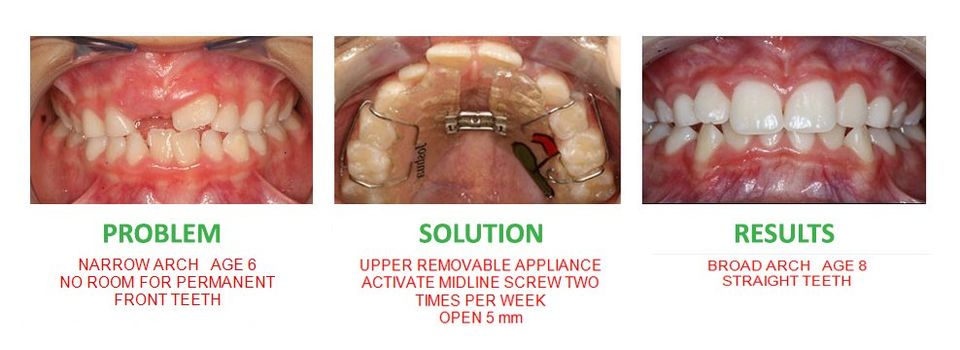Ukiah General Dentistry
Call Us Today:
(707) 462-5706
toothache1096@yahoo.com
| 1096 S. Dora Street Ukiah, CA 95482
Dental Services
Dental Services We Offer
At Ukiah General Dentistry, we understand you may be apprehensive about going to the dentist. This is why we provide a wide range of services to make your visit comprehensive and efficient. From involved treatments, such as dentures and extractions, to preventive checkups, count on our skilled and knowledgeable team to make your visit as pain-free as possible.
We offer in-office Zoom Whitening, emergency services, and much more to keep your smile healthy.
Call today to schedule an appointment or to speak directly with our dedicated office staff. We will promptly answer any questions or concerns you may have.
To schedule a consultation with the professionals at Ukiah General Dentistry, call us at
707-462-5706.
To schedule a consultation with the professionals at Ukiah General Dentistry, call us at 707-462-5706.
Preventative Care Services


How Do I Clean My Teeth At Home?
Home teeth cleaning recommendations haven’t changed that much in many years. The most important thing is to keep a regular routine so that you clean the plaque off your teeth daily to prevent tartar buildup. You should brush at least 2 times each day for 2 minutes. You should floss daily. Mouthwashes are optional, but can be beneficial.
What Is A Deep Cleaning?
What many people refer to as a deep cleaning is also known as scaling and root planing. Unless you have gum disease, you don’t need a deep cleaning. If you do have gum disease that has progressed beyond a mild case of gingivitis, then a deep cleaning is a way to remove the infection that is now beneath the gum line. Keep up with your regular cleanings and a good home brushing and flossing routine, and you are much less likely to ever need a deep cleaning.
Why Do I Need Regular Check Up & Cleaning At The Dentist's Office?
Regular check-up help us catch small problems with your teeth, gums and mouth that would probably go undetected until becoming more serious. Problems that we may be able to spot early during an oral exam and cleaning could include:
- Areas that require additional cleaning attention to prevent cavities and disease
- Early stages of cavities
- Gingivitis or early gum disease
- Oral cancer
Regular teeth cleaning of teeth is a crucial part of good oral hygiene and is needed periodically to maintain the health of your teeth and gums. Even with good habits, you’ll probably still miss some of the plaque that forms on your teeth. Since plaque can harden into difficult to remove tartar in less than two days, it isn’t hard to start getting a little tartar buildup.
Dentures
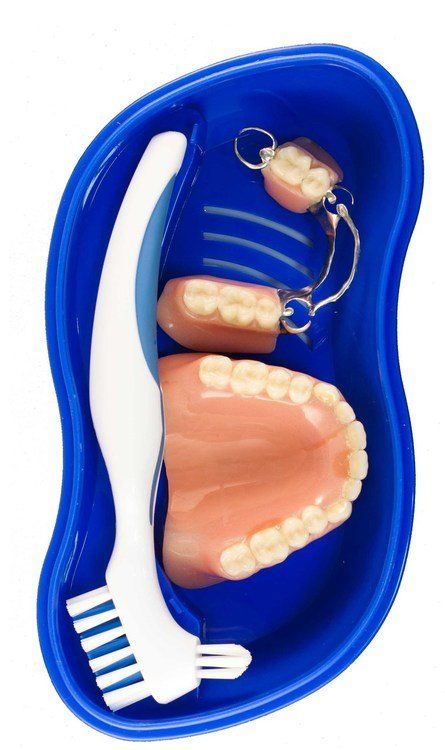
Dentures are removable replacements for missing teeth and surrounding tissues. Made from plastic or acrylic, the best dentures look like natural teeth and gums. Complete permanent dentures are made to replace all of your teeth while partial dentures close gaps created by single missing teeth and prevent tooth shifting. Immediate dentures are placed on the same day as tooth extractions. Conventional dentures are placed after gum tissues have healed.
What Do I Need To Do To Take Care Of My Dentures?
Remove your dentures and brush them every day. When you’re not wearing them, soak your dentures in water or denture cleanser. Never use hot or boiling water to sterilize your dentures. To improve stability, use denture adhesives as directed. Be sure to remove your dentures at night.
How Long Is The Process For Getting Dentures?
It generally takes five appointments (about a couple months) to complete the process. After an initial evaluation, a wax bite and impression are created to match the dimensions in your mouth. The final denture is placed after it is tested and adjusted for shape, fit, and color. It may take several weeks to get accustomed to wearing dentures.
Dentures
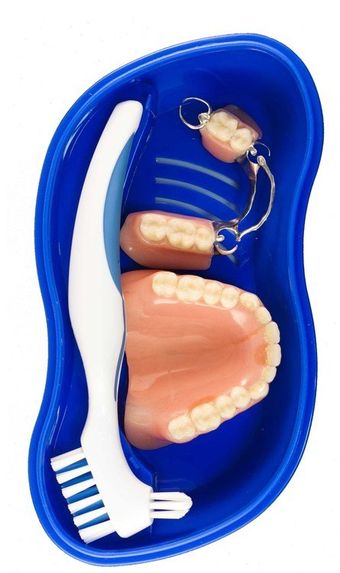

Dentures are removable replacements for missing teeth and surrounding tissues. Made from plastic or acrylic, the best dentures look like natural teeth and gums. Complete permanent dentures are made to replace all of your teeth while partial dentures close gaps created by single missing teeth and prevent tooth shifting. Immediate dentures are placed on the same day as tooth extractions. Conventional dentures are placed after gum tissues have healed.
How Long Is The Process For Getting Dentures?
It generally takes five appointments (about a couple months) to complete the process. After an initial evaluation, a wax bite and impression are created to match the dimensions in your mouth. The final denture is placed after it is tested and adjusted for shape, fit, and color. It may take several weeks to get accustomed to wearing dentures.
What Do I Need To Do To Take Care Of My Dentures?
Remove your dentures and brush them every day. When you’re not wearing them, soak your dentures in water or denture cleanser. Never use hot or boiling water to sterilize your dentures. To improve stability, use denture adhesives as directed. Be sure to remove your dentures at night.
Root Canal Treatment
What Is A Root Canal Procedure?
The procedure of root canal treatment is performed when the tooth pulp has become infected (a condition known as pulpitis) or when the infection has spread to the roots or jawbone. Microbes and infected tissue are removed from the pulp and roots using special needles and chemical rinsing substances. After the tooth has been disinfected, a filling material is placed in the root canal.
Which Factors Affect The Outcome Of Root Canal Treatment?
The treatment is considered successful when the infection disappears and the tooth works properly and looks natural.
Although root canal treatment can be performed in most cases, it can be difficult to predict how successful it will be. The following factors influence the outcome.
GENERAL HEALTH
Root canal treatment and the patient’s general health determine how well the infection can be cured. Some diseases (e.g., diabetes) and medications (e.g., those for cancer or rheumatoid arthritis) weaken the body’s defense system, and root canal treatment may not be as effective in treating advanced tooth infections in these cases.
EXTENT OF INFECTION AND MICROBES
The extent of the infection and the quality of the microbes affect the outcome. Certain bacteria (e.g., Enterococcus faecalis and Streptococcus mitis) are hard to remove with the substances and antibiotics that are used in root canal treatment.
NUMBER AND ANATOMY OF ROOT CANALS
It is more challenging to perform root canal treatment on a tooth that has multiple roots. Incisors and canine teeth usually have one root; premolars have one or two roots; and molars have three or four roots. In addition to the roots’ number and location, their shape influences the outcome. Sometimes, tooth roots are partially or completely ossified, making it challenging if not impossible to clean the root canal.
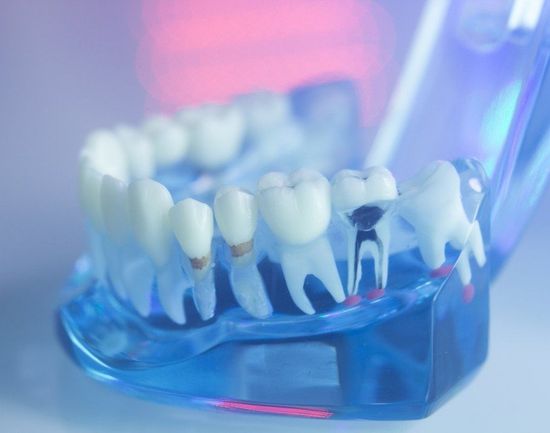
Why Is A Root Canal Procedure Needed?
The infection creates swelling and increased pressure in the pulp.
Toothache and throbbing are common symptom of an infected tooth. A mild infection can clear up, and the tooth can be fixed using a dental filling. Root canal treatment is needed when the tooth is severely infected or when tooth decay has reached the pulp. If the infection of the pulp is left untreated, it can reach the tooth’s roots or even the jawbone. Tooth root infection, also known as apical periodontitis, doesn’t go away on its own, and it has to be treated with a root canal.
When Is A Root Canal Procedure Not Possible?
Root canal treatment is performed when severe tooth decay, cracking or trauma has damaged a tooth that is worth preserving. It may not be a suitable treatment option if the tooth is too badly damaged.
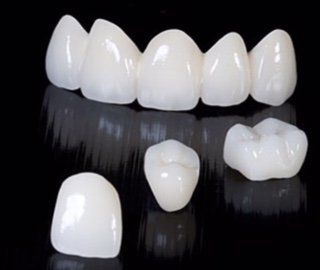
Crowns & Bridges
When Do I Need A Crown?
When a tooth has a cavity or a fracture that involves half the width of the tooth or more, it may need to be covered with a crown.
• Large Filling- this is because the remaining tooth around the large filling is so weak that it is prone to fracture
• After Root Canal Treatment- Root canal treatment leaves the tooth hollowed out and predisposes the remaining tooth to cracking. So, a tooth that has had a root canal should be restored with a crown immediately to prevent it from fracturing.
• Fracture of Cusp- Sometimes a cusp (the pointy part) of a tooth will fracture due to trauma. These are the parts of the tooth that take on a lot of the chewing stress, and typically simple fillings are not strong enough to replace them for the long.
• Unaesthetic Teeth- Teeth that have an unacceptable appearance due to color, shape, or spaces between teeth can be made to look very natural and beautiful with crowns.
How Long Does The Crown Last?
The research on dental crowns indicate that most will last an average of 10 to 15 years. However, there are factors that influence this figure. A person who has a high risk of cavities (someone who has to have a couple of fillings each year for example), or grinds their teeth, or has poor oral hygiene habits may find that their crown lasts less than the average.

Composite Fillings
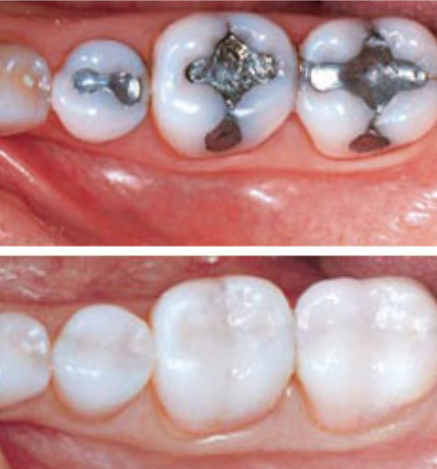
What are Composite (mercury free, tooth colored) Fillings?
A white, composite filling is a tooth-colored filling which is made from glass and plastic mixture. They are used to restore decayed or damaged teeth. Composites are preferred by patients because they are more aesthetically pleasing than metal amalgam fillings, they are white and can be tinted to match the shade of a natural tooth.
Why choose composite fillings over metal fillings?
The most obvious answer is appearance. All-white fillings won’t compromise your gorgeous smile. Another benefit of composite fillings is that they require less removal of healthy, tooth structure, allowing for more conservative restorations.
Can you replace my old fillings?
Many people opt to remove metal fillings and replace them with composites for purely aesthetic reasons. If your old repair starts to crack or leak, you should definitely have the filling updated.
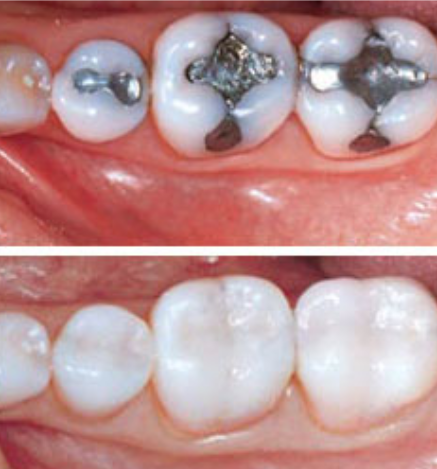
What are Composite (mercury free, tooth colored) Fillings?
A white, composite filling is a tooth-colored filling which is made from glass and plastic mixture. They are used to restore decayed or damaged teeth. Composites are preferred by patients because they are more aesthetically pleasing than metal amalgam fillings, they are white and can be tinted to match the shade of a natural tooth.
Why choose composite fillings over metal fillings?
The most obvious answer is appearance. All-white fillings won’t compromise your gorgeous smile. Another benefit of composite fillings is that they require less removal of healthy, tooth structure, allowing for more conservative restorations.
Can you replace my old fillings?
Many people opt to remove metal fillings and replace them with composites for purely aesthetic reasons. If your old repair starts to crack or leak, you should definitely have the filling updated.
Whitening
What Is Tooth Whitening?
Commonly, tooth discoloration can be caused by, aging, consumption of coffees, teas, caffeine soft drinks, red wines, etc. It can also occur during tooth formation due to trauma and medications taken during this time.
Tooth whitening is a process where a mild bleaching solution is applied to the tooth, using a custom fit tray, to whiten tooth discolorations of the enamel and dentin. The most popular methods are using a home tooth whitening system and In-office whitening procedure (we provide home tray as well).
Is Tooth Whitening Safe?
Yes, studies indicate that tooth whitening under the supervision of a dentist is safe for the teeth and the gums. Tooth whitening is a simple, non-invasive dental treatment and an ideal way to enhance the beauty of your smile. However, it is not recommended for anyone under the age of thirteen or pregnant or lactating women.
How Does Tooth Whitening Gel Work?
As the carbamide peroxide (active ingredient) is broken down, oxygen enters the enamel and the dentin and dissolves the stains. Since tooth whitening only works on natural tooth, it is important to evaluate replacement of any old fillings, crowns, etc. Replacement of any restoration will be done after whitening so they will match the newly whitened teeth.
What About Sensitivity?
You may experience mild, temporary sensitivity during/ after whitening procedure. It should subside within a few hours after treatment. If sensitivity does persist, wear time can be varied or teeth can be treated with desensitizing toothpaste. We recommend to brush with desensitizing tooth paste for a couple of weeks before whitening if a patient has teeth sensitivity.
How Long Will It Last?
Your teeth will always be lighter than they were initially. Your teeth may need to be "touched up" 1-2 applications, once or twice a year. Actually, touched up needs more often if you smoke, drink coffee, tea, or wine. To keep your teeth looking their best we recommend flossing, and brushing twice daily with professional whitening toothpaste, specifically designed to keep your teeth looking their brightest.
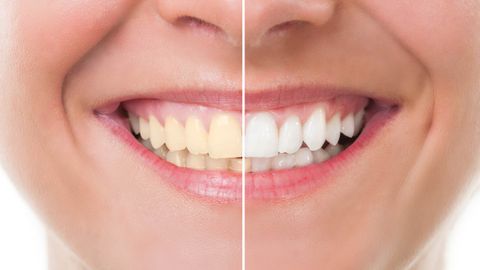
Extraction
After tooth extraction, it's important for a blood clot to form to stop the bleeding and begin the healing process. We ask you to bite on a gauze pad in the tooth extraction area for 30 minutes after the appointment. If the bleeding or oozing persists, repeat the process. After the blood clot forms, it is important not to dislodge the clot. Do not rinse vigorously, suck on straws, smoke, drink alcohol or brush teeth next to the extraction site for 72 hours. These activities will dislodge the clot. Limit vigorous exercise for the next 24 hours as this will increase blood pressure and may cause more bleeding from the extraction site.
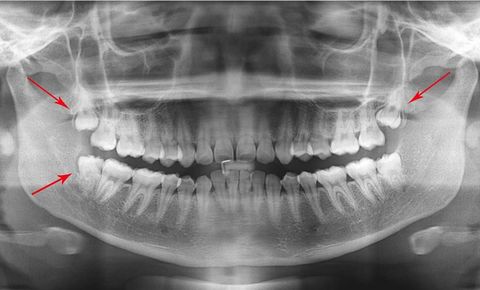
After tooth extraction, it's important for a blood clot to form to stop the bleeding and begin the healing process. We ask you to bite on a gauze pad in the tooth extraction area for 30 minutes after the appointment. If the bleeding or oozing persists, repeat the process. After the blood clot forms, it is important not to dislodge the clot. Do not rinse vigorously, suck on straws, smoke, drink alcohol or brush teeth next to the extraction site for 72 hours. These activities will dislodge the clot. Limit vigorous exercise for the next 24 hours as this will increase blood pressure and may cause more bleeding from the extraction site.
After the tooth is extracted you may feel some pain and experience some swelling. An ice pack applied to the area will keep swelling to a minimum. Take pain medications as prescribed by American Dental. The swelling will usually subside in about 48 hours.

Use the pain medication as directed. Call the office if the medication doesn't seem to be working. If antibiotics are prescribed, continue to take them for the indicated length of time, even if signs and symptoms of infection are gone. Drink lots of fluid and eat nutritious soft food on the day of the extraction. You can eat normally as soon as you are comfortable.
After the tooth is extracted you may feel some pain and experience some swelling. An ice pack applied to the area will keep swelling to a minimum. Take pain medications as prescribed by American Dental. The swelling will usually subside in about 48 hours.
Use the pain medication as directed. Call the office if the medication doesn't seem to be working. If antibiotics are prescribed, continue to take them for the indicated length of time, even if signs and symptoms of infection are gone. Drink lots of fluid and eat nutritious soft food on the day of the extraction. You can eat normally as soon as you are comfortable. It's important to resume your normal dental routine after 24 hours. This should include brushing and flossing your teeth at least twice a day. This will speed healing and help keep your mouth fresh and clean.
After a few days you will feel fine and can resume your normal activities. If you have heavy bleeding, severe pain, continued swelling after 2-3 days, or a reaction to the medication, call our office immediately at 707-462-5706.
Children Dentistry
• Exam and prophy
• Sealant
• Filling
• Extraction
• Pulp therapy and SS crown
• Orthodontics
Why Are The Primary Teeth (Baby Teeth) Important?
It is very important to maintain the health of the primary teeth. Neglected cavities can and frequently do lead to problems which affect developing permanent teeth. Primary teeth, or baby teeth are important for:
1. Proper chewing and eating
2. Providing space for the permanent teeth and guiding them into the correct position
3. Permitting normal development of the jaw bones and muscles.
Primary teeth also affect the development of speech and add to an attractive appearance.

What Is A Functional Appliance For Early Orthodontic Treatment?
Functional appliances can help guide the growth of our children and can help correct finger sucking habits, tongue thrusting habits, crowded teeth due to narrow arch, airway problems and etc. By developing dental arches with functional appliance at an early age, we may prevent the crowding of the permanent teeth. Since 90% of the face is developed by age 12, treatment of the child’s bite problems should be corrected early to avoid more costly and lengthy treatment later on.
One of the main advantages of early treatment is that it prevents the need to remove adult teeth later on.
CONTACT US
Phone: (707) 462-5706
Email: toothache1096@yahoo.com
Email: toothache1096@yahoo.com
Hours
| Mon-Fri: | 8:00 AM - 5:00 PM |
Visit
1096 S. Dora Street Ukiah, CA 95482
Content, including images, displayed on this website is protected by copyright laws. Downloading, republication, retransmission or reproduction of content on this website is strictly prohibited. Terms of Use
| Privacy Policy

